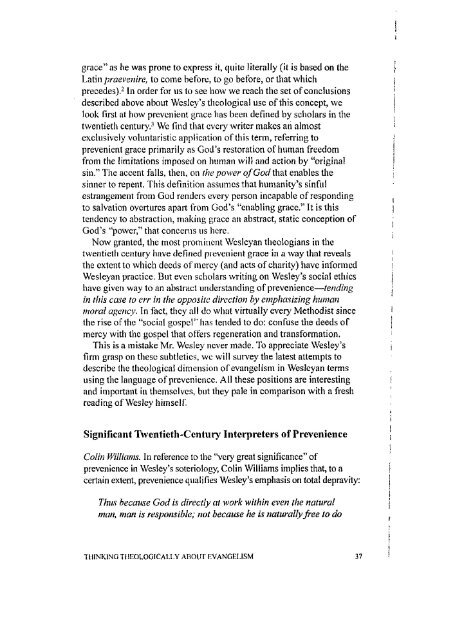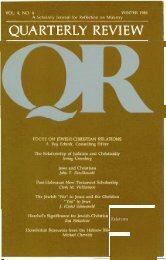Spring 1999 - Quarterly Review
Spring 1999 - Quarterly Review
Spring 1999 - Quarterly Review
You also want an ePaper? Increase the reach of your titles
YUMPU automatically turns print PDFs into web optimized ePapers that Google loves.
grace" as he was prone to express it, quite literally (it is based on theLatin praevenire, to come before, to go before, or that whichprecedes). 2In order for us to see how we reach the set of conclusionsdescribed above about Wesley's theological use of this concept, welook first at how prevenient grace has been defined by scholars in thetwentieth century. 3We find that every writer makes an almostexclusively voluntaristic application of this term, referring toprevenient grace primarily as God's restoration of human freedomfrom the limitations imposed on human will and action by "originalsin." The accent falls, then, on the power of God that enables thesinner to repent. This definition assumes that humanity's sinfulestrangement from God renders every person incapable of respondingto salvation overtures apart from God's "enabling grace." It is thistendency to abstraction, making grace an abstract, static conception ofGod's "power," that concerns us here.Now granted, the most prominent Wesleyan theologians in thetwentieth century have defined prevenient grace in a way that revealsthe extent to which deeds of mercy (and acts of charity) have informedWesleyan practice. But even scholars writing on Wesley's social ethicshave given way to an abstract understanding of prevenience—tendingin this case to err in the opposite direction by emphasizing humanmoral agency. In fact, they all do what virtually every Methodist sincethe rise of the "social gospel" has tended to do; confuse the deeds ofmercy with the gospel that offers regeneration and transformation.This is a mistake Mr. Wesley never made. To appreciate Wesley'sfirm grasp on these subtleties, we will survey the latest attempts todescribe the theological dimension of evangelism in Wesleyan termsusing the language of prevenience. All these positions are interestingand important in themselves, but they pale in comparison with a freshreading of Wesley himself.Significant Twentieth-Century Interpreters of PrevenienceColin Williams. In reference to the "very great significance" ofprevenience in Wesley's soteriology, Colin Williams implies that, to acertain extent, prevenience qualifies Wesley's emphasis on total depravity:Thus because God is directly at work within even the naturalman, man is responsible; not because he is naturally free to doTHINKING THEOLOGICALLY ABOUT EVANGELISM 37












